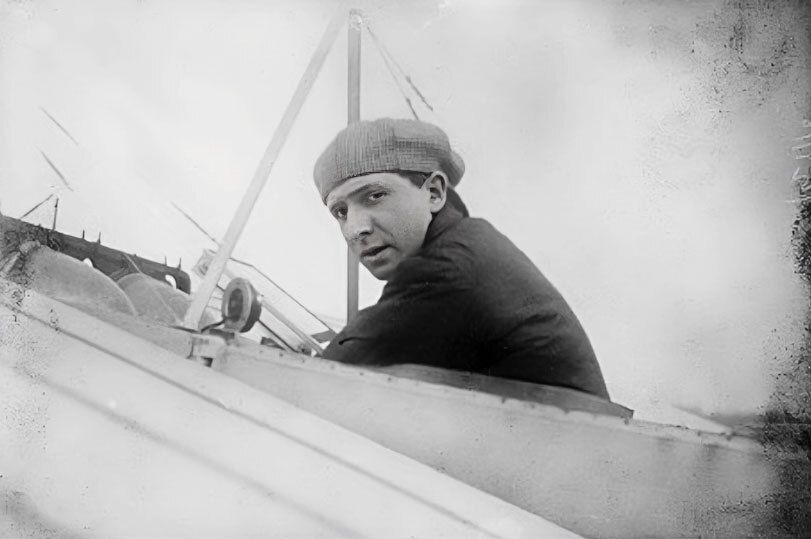Jorge Chávez
Peruvian Aviator

[ Scroll down for English translation ]
Jorge Chávez Dartnell, nacido en 1887 en París de padres peruanos, es considerado un aviador pionero cuyo valor y determinación dejaron una huella profunda en la historia de la aviación. Aunque pasó gran parte de sus primeros años de vida en Francia, Chávez permaneció profundamente vinculado a sus raíces peruanas, llevando el espíritu de su patria a los cielos. Tras estudiar ingeniería, se sintió cautivado por el creciente campo de la aviación. Su incansable búsqueda del vuelo le llevó a dominar el arte de pilotar uno de los aviones más emblemáticos de la época, el Blériot XI, un monoplano cuya navegación exigía habilidad y valentía.
En 1910, el nombre de Chávez se convirtió en sinónimo de heroísmo aeronáutico cuando se embarcó en un ambicioso desafío que pondría a prueba los límites del ser humano y de la máquina: cruzar los Alpes por aire. El 23 de septiembre de 1910, al timón de su fiel Blériot, Chávez despegó de Brig (Suiza) con el objetivo de llegar a la localidad italiana de Domodossola. A pesar de las duras condiciones y de la fragilidad de los aviones de principios del siglo XX, la determinación de Chávez le impulsó a seguir adelante. Cruzó con éxito la traicionera cordillera, convirtiéndose en la primera persona en hacerlo. Sin embargo, justo cuando se acercaba a su destino, su avión sufrió turbulencias que provocaron un aterrizaje forzoso que hirió gravemente al joven aviador.
Aunque Jorge Chávez sucumbió a sus heridas cuatro días después, su legado fue mucho más allá de aquel malogrado vuelo. Su extraordinaria hazaña inspiró a generaciones de aviadores y consolidó su estatus de héroe nacional en Perú. Hoy se le recuerda no sólo por su espíritu audaz, sino también por su contribución a la historia de la aviación: un testimonio de lo que se puede conseguir cuando uno se atreve a soñar y a superar los límites de lo alcanzable.
Jorge Chávez Dartnell, born in 1887 in Paris to Peruvian parents, is celebrated as a pioneering aviator whose courage and determination left an indelible mark on the history of aviation. Although he spent much of his early life in France, Chávez remained deeply connected to his Peruvian roots, carrying the spirit of his homeland to the skies. After studying engineering, he became captivated by the burgeoning field of aviation. His relentless pursuit of flight led him to master the art of piloting one of the era's most iconic aircraft—the Blériot XI—a monoplane that demanded skill and bravery to navigate.
In 1910, Chávez's name became synonymous with aviation heroism when he embarked on an ambitious challenge that would test the limits of humans and machines: crossing the Alps by air. On September 23, 1910, at the helm of his trusty Blériot, Chávez took off from Brig, Switzerland, to reach the Italian town of Domodossola. Despite the harsh conditions and the frailty of early 20th-century aircraft, Chávez's determination propelled him forward. He successfully crossed the treacherous mountain range, becoming the first person to do so. However, just as he neared his destination, his plane encountered turbulence, leading to a crash landing that severely injured the young aviator.
Though Jorge Chávez succumbed to his injuries four days later, his legacy soared far beyond that ill-fated flight. His remarkable achievement inspired generations of aviators and cemented his status as a national hero in Peru. Today, he is remembered for his daring spirit and contribution to aviation history—a testament to what can be achieved when one dares to dream and push the boundaries of what is possible.
